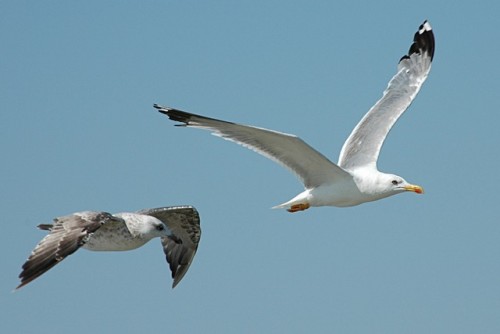|
BIRDS OF THE BIBLE
 A distinguishing characteristic of birds is that the arms—which in mammalia generally serve for support upon the ground or on trees, also for weapons of offense and defense, in man for work, and in all for expressing most effectively the power of the animal—are transformed into wings, the chief use of which is to support their possessor in the air, whence he commands an extensive view, and to bear him with extreme rapidity from place to place. Another peculiarity of birds is the sharpness of their sight, and the wonderful quickness with which it is accommodated to objects at various distances. A distinguishing characteristic of birds is that the arms—which in mammalia generally serve for support upon the ground or on trees, also for weapons of offense and defense, in man for work, and in all for expressing most effectively the power of the animal—are transformed into wings, the chief use of which is to support their possessor in the air, whence he commands an extensive view, and to bear him with extreme rapidity from place to place. Another peculiarity of birds is the sharpness of their sight, and the wonderful quickness with which it is accommodated to objects at various distances.
Their other organs of sense are not remarkably developed. The touch cannot be delicate through a coat of feathers; the tasting papilla of the tongue are few; the olfactory nerves are small in most birds; and even the ears, though quick and delicate within certain limits, do not attain a high development, either externally or internally. The sensitive power of birds is concentrated in the eyes, which are very large, and marvelously quick to discern objects near or remote.
The creature whose chief powers are those of rising into the air, of penetrating vision, and of rapid flight, is a representative of the human faculty of rising in thought out of the common states of life, of obtaining clear ideas of states quite remote, and entering into them with intellectual delight.
It is a faculty unlike that represented by the beasts of burden, in that it does not attempt to introduce our affections, knowledge, and life into the states observed; but merely to obtain a distinct idea of them, with, perhaps, some taste of their productions. After obtaining such an idea, we may make the effort to transport ourselves into the new state of life, which is comparatively a slow, toilsome process; or we may desire to bring into our lives, as they are, some new element of which we have obtained an idea; and this also is a process involving mental labor. This is a kind of work which birds do not do, except in the small degree which is represented by their carrying seeds and small fruits, and sometimes larger prey, to their nests. But good spiritual birds have a very exquisite pleasure in seeing in the light of heaven, and thinking in the air of heaven, cared for and blessed by the Lord.
The feathers of such birds represent what is good and beautiful in spiritual thought. For garments represent that which is right and becoming to him who is clothed. The wool of sheep represents the reverent and affectionate manners of those who are in love to the Lord and mutual love; the hair of goats represents the truths of charity expressed by those who are in neighborly love from principle. And the feathers of birds describe the grace and delight of thinking.
The wings of birds, by which they take hold of the air and climb, are the power of feeling the reality and the support of spiritual truth and heavenly influences. The influence of good spirits and angels is about everyone, and a divine influence from the Lord. The mere presence of these does not raise the mind into the region of heavenly thought. But if one acknowledges their reality, and, trusting to their support, endeavors to think truly of heaven and of the Lord in heaven, he immediately begins to float. Therefore the experiences of the reality and supporting power of angels’ thought and affection are the pinions of the wings. If these are extensive, and their conscious hold of such supporting influence is strong, the mind spreads its wings and soars in easy sweeps. If they are slight and weak, the mind is obliged constantly to reassure itself of the reality of spiritual things, and takes only short and labored flights.
Under their wings birds gather their young for safety, saying in effect that tender affections for spiritual thought are justified and protected by the experience and power of others in spiritual thinking. Under their wings they protect their own heads as they sleep, shielding their lives by their knowledge and experience of heavenly influences. They are made as forms of trust in the protection of heaven; even in the egg the birdlings grow with their heads under their wings.
There is a remarkable difference between birds and the mammalia as to the mode of reproduction. The birds lay eggs containing all the materials from which the young are formed, and sit upon them and care for them, giving them closest attention until the development is complete.
In mammalia the egg is retained by the mother, and grows gradually, with comparatively little attention, from the daily life of the mother, until the young are ready for separate life. The birds are forms of affection for thinking, and even their young immediately become objects of thought and absorbing attention. The mammalia are forms of affection for living; and their young become similar forms not by thoughtful attention, but by being a part of their parents’ living, till they are completely developed.
Author: JOHN WORCESTER 1875
|
|